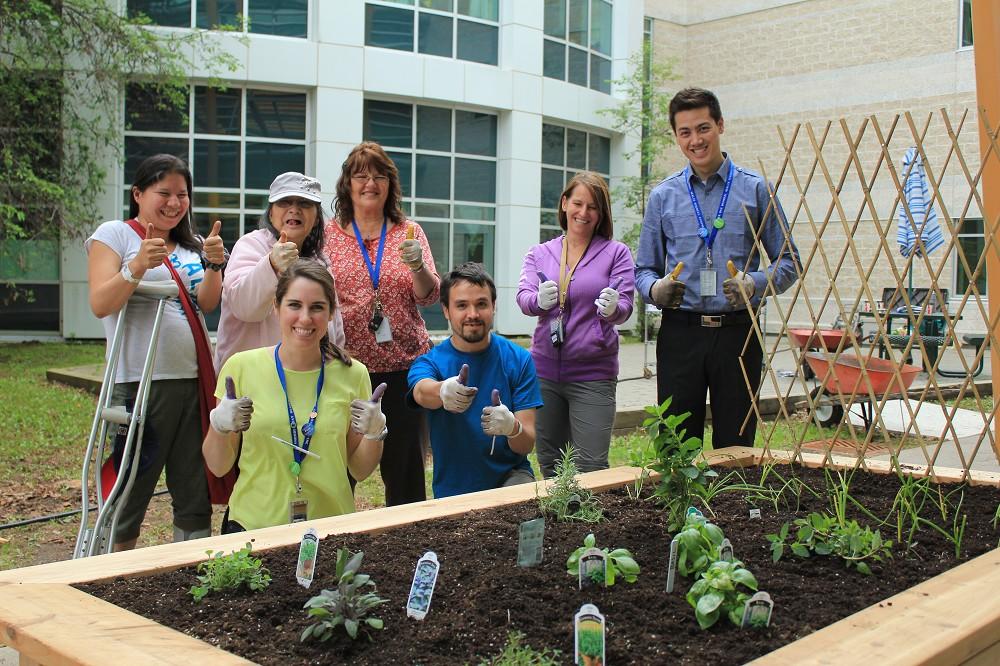Mental Health Patients Benefit from Caring for Vegetable Gardens
by Julia Bailey
 Patients and TBRSHC staff ‘thumbs-up’ the freshly planted vegetable gardens to be cared for and consumed by Mental Health Program patients as part of their therapeutic programming.
Patients and TBRSHC staff ‘thumbs-up’ the freshly planted vegetable gardens to be cared for and consumed by Mental Health Program patients as part of their therapeutic programming.It is common knowledge that growing your own food in a vegetable garden provides healthy, fresh produce that can give your diet a delicious boost. However, less commonly known are the mental health benefits that also stem from gardening. This form of ‘horticultural therapy’ inspired the Mental Health Programs at the Thunder Bay Regional Health Sciences Centre (TBRHSC) to build vegetable gardens for their patients to plant, care for and cook with.
In early June, four raised garden boxes were constructed at TBRHSC and patients from Adult Mental Health and Forensics Mental Health spent the day getting their hands dirty filling the boxes with soil and planting a wide variety of vegetables. Some of the vegetables that patients will grow and enjoy in a healthy meal include: tomatoes, snap peas, pole beans, chives, onions, coloured carrots, lettuce, spinach, swiss chard, cucumbers, kale, rhubarb, zucchini and a wide variety of herbs.
Dr. Peter Voros, Director of Adult and Mental Health at TBRHSC, is a strong supporter of initiatives like the vegetable gardens. “We have been well aware of the impact of proper nutrition on mental health for quite some time. What has been more recently substantiated is the impact that activities like community gardening can have on mental health. The mental health programs at TBRHSC have been working hard to provide patients with a growing list of activities to help in their recovery. These gardens are another step to improving the lives and health of our patients.”
According to Mind, a mental health organization from the UK, the benefits of gardening for mental health include decreased anxiety and depression, provides a ‘time-out’ from stress, improve sleep quality, encourages awareness of the external environment, and provides an opportunity for light physical activity. “This is a very exciting venture for our patients. These gardens will be a place where our patients can grow plants, spend time together, be active outdoors, and reap the rewards of their efforts,” says Joelle Macey, Patient Care Coordinator for Adult Mental Health.
Throughout the growing season, patients, with the guidance of program staff, will continue to tend to the gardens and harvest the vegetables as they are seasonally available – the best part! The produce will be enjoyed as snacks and integrated into food preparation and cooking activities. The majority of the vegetables planted can be eaten with minimal preparation needed to allow for simple, healthy snacks, such as a handful of cherry tomatoes or a carrot. Some however will allow for more intensive cooking such as baking with rhubarb or making pesto with basil or seasoning potatoes with rosemary in the kitchens that are available to patients on the units.
“Our patients will not only learn valuable basic gardening knowledge, but they will also harvest these vegetables and acquire practical skills for preparing meals with the fresh produce. Collectively, this can be an extremely rewarding and satisfying experience,” adds Macey.
TBRHSC staff have been very enthusiastic about the gardens and believe it is a valuable initiative for mental health patients. Often they can be seen monitoring the maturation of the gardens while enjoying a meal at Flavours, the TBRHSC Cafeteria or wandering through them to take in the wonderful scents of fresh herbs. Many want to know where they can find a raised bed like them for their own home!
Patients from other areas of the hospital, visitors and volunteers are welcome to tour the garden for themselves. They are located just outside Flavours, the TBRHSC cafeteria on the lower level.